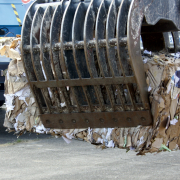Recycling Given Welcome Prominence in EU’s Critical Raw Materials Act
The pivotal role of recycling in guaranteeing a sustainable supply of critical raw materials (CRMs) was emphasized at the meeting of BIR’s International Environment Council in Copenhagen on May 29.
Julia Blees, Secretary General of the European Recycling Industries’ Confederation, underlined the level of prioritization given to securing CRM supplies when noting that the EU’s Critical Raw Materials Act had been proposed as recently as March 2023 and had entered into force just 14 months later. “In European terms, it’s super-fast, lightning speed,” she told delegates.
The Act stipulates that, by 2030, the EU’s recycling capacity should be able to produce at least 15% of the Union’s annual consumption of each strategic raw material. In what Ms Blees highlighted as particularly positive developments, the Act also calls for the acceleration of permitting processes for recycling projects and for the introduction of recycled content targets for some CRMs. It was now “absolutely crucial” that alignment was achieved between the CRM Act and other legislation, she contended.
Taking rare earth metals used in wind turbines and electric vehicles as an example, Ms Blees reported that EU demand for was set to soar by a factor of five or six by 2030.
Related actions and policy developments in the USA were outlined by Adam Shaffer, Assistant Vice President of International Trade and Global Affairs at the US Recycled Materials Association. As in Europe, he said, the USA’s heavy reliance on foreign sources for critical minerals had come into sharper focus given the increase in geopolitical tensions over recent years.
Having explained that US government agencies were maintaining lists of critical minerals and materials, he went on to note that the USA was currently in the process of negotiating critical minerals agreements with the EU and the UK, following the one signed with Japan in March last year.
Professor Yves Jégourel of the ‘Conservatoire national des Arts et Métiers’ in Paris, who is also Co-head of CyclOpe, had earlier set the scene with an overview of the impact on critical raw materials of the transition towards an environmentally more sustainable future. He noted, by way of example, that demand for lithium was expected to increase by a factor of 42 between 2020 and 2040 while the multiplier for copper was put at 2.6.
For many countries, this greater dependence on critical resources would create risks from a constrained supply. As a result, said Prof. Jégourel, there would be a temptation for protectionism that was at once “understandable” but “dangerous” as its outcomes could not be predicted with any certainty.
The BIR International Environment Council’s Chairman Olivier François of the Galloo recycling company highlighted the lack of coherence of the EU looking to secure supplies of CRMs from overseas at a time when its newly-revised Waste Shipment Regulation threatened to block European flows of secondary raw materials to the many developing countries that relied upon them.
He also pointed to some of the difficulties surrounding long-term planning with CRMs given that the mix of ingredients in products like EV batteries was constantly changing as technologies evolved.
Source: BIR (Brussels, June 3, 2024)








